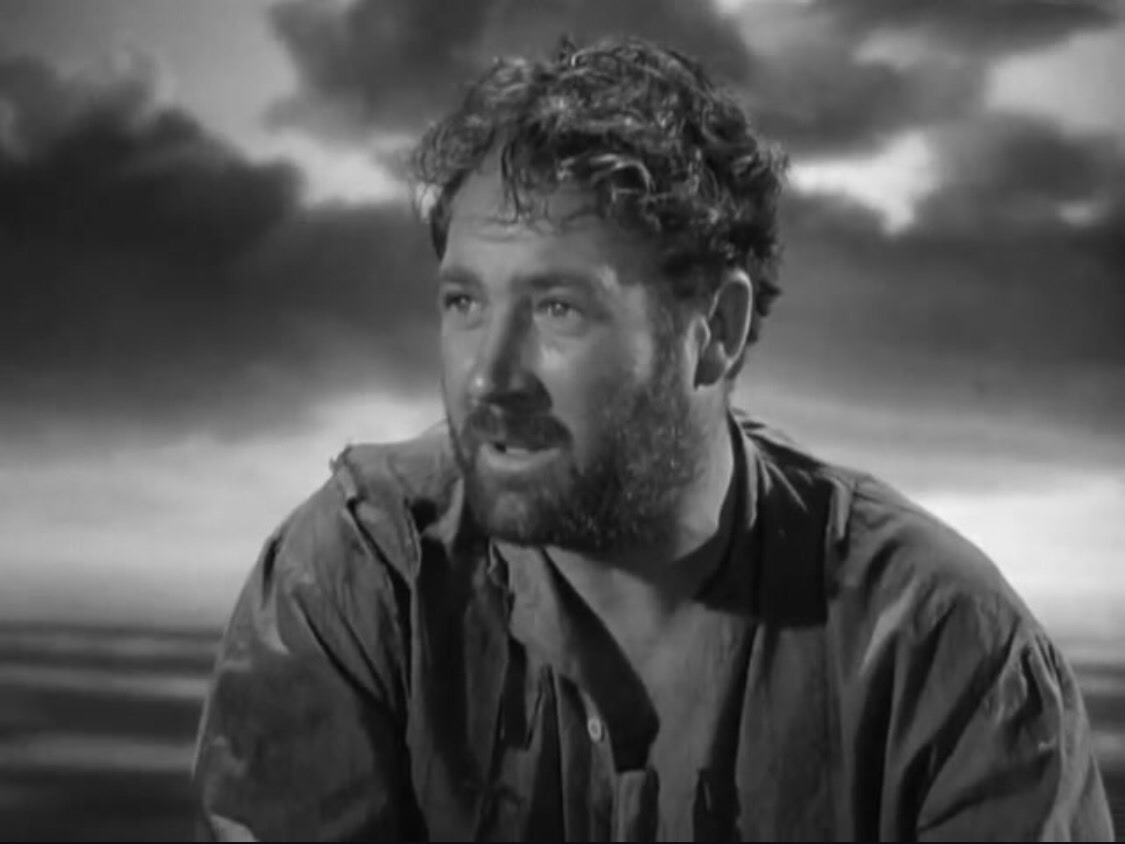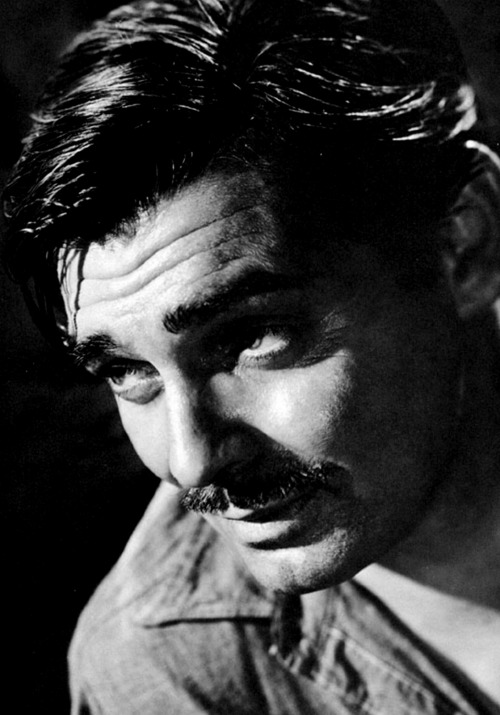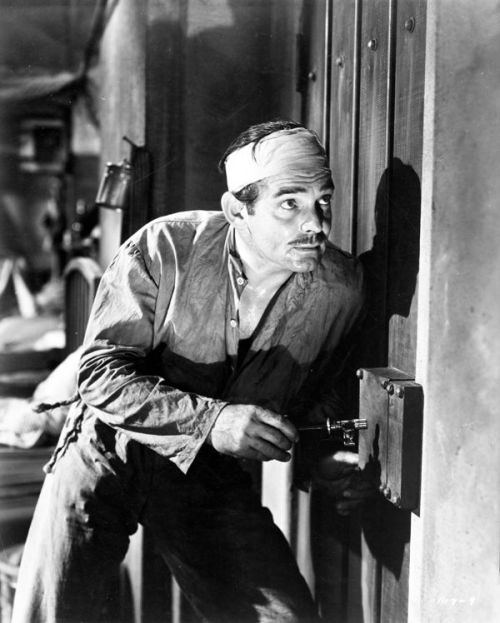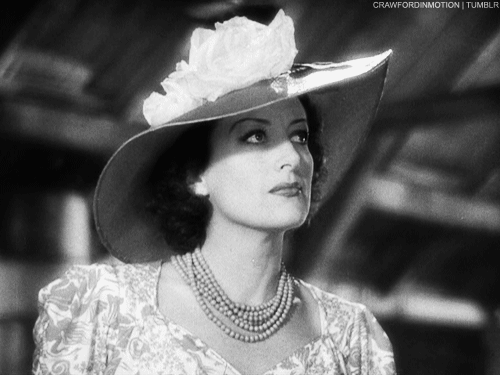Clark Gable e Joan Crawford fizeram oito filmes
juntos. O primeiro deles foi em 1931, e o último em 1940. “Almas Rebeldes” é
este último filme da parceria, um filme que veio logo depois de muito sucesso
para ambos: em 1939 Gable fez um pequeno filme chamado “E o Vento Levou...” e
Crawford foi uma das estrelas de “As Mulheres”. “Almas Rebeldes” foi, para as
duas estrelas, uma grande mudança em relação à pompa de seus trabalhos
pregressos.
Clark Gable and Joan
Crawford made eight films together. Their first pairing was in 1931, and their
last in 1940. “Strange Cargo” is this last film they made together, and it came
following successes from both: in 1939, Gable was in a little film called “Gone
with the Wind” and Crawford was one of the many stars in “The Women”. “Strange
Cargo” was a complete change from the glamour and pomp for the two stars.
Apenas pessoas esquecidas vivem na Guiana – um
local que, no mundo do cinema, se parece muito com a África de “O Diabo Riu por Último” (1953). Há uma grande prisão lá, para 'homens que perderam as
esperanças'. E as mulheres que trabalham no bar local são imigrantes que fariam
qualquer coisa para sobreviver. Mas há uma regra: mulheres e prisioneiros não
podem ser vistos juntos. É por isso que o prisioneiro Verne (Clark Gable)
representa encrenca para Julie (Joan Crawford). O primeiro contato dele é mias
para violento que para romântico, e ele só pensa em uma coisa: em fugir.
Only forgotten people
live in Guiana – a place that, in the film world, looks a lot like the Africa
we see in 1953's “Beat the Devil”. There is a big prison there, for 'men who
have lost hope'. And the women who work in the local bar are immigrants who
would do anything to survive. But there is a rule: women and inmates can't be
seen together. That is why prisoner Verne (Clark Gable) represents trouble to
Julie (Joan Crawford). His first approach is more violent than romantic, and he
only thinks of one thing: escaping.
Verne tenta fugir pela primeira vez no filme
depois de ir trabalhar no porto carregando e descarregando navios. Ele entra no
bar de Renard, onde Julie, que ele havia visto mais cedo naquele mesmo dia,
trabalha. Enquanto ele se esconde no quarto dela, Julie conta para os guardas o
paradeiro de Verne. Ele é recapturado, mas Julie foi encontrada com ele, e por
isso deve sair da colônia em até 12 horas.
Verne makes his first
attempt to escape in the movie by running away after he goes to the harbor to
load ships. He ends up in Renard's bar, where Julie, who he has seen earlier
that day, works. While he is hiding in her room, Julie tells the guards where
he is. Verne is recaptured, but Julie was found with him, and thus she must
leave the colony within 12 hours.
De volta à prisão, Verne se envolve em um plano
de fuga com outros oito homens. Seu inimigo, Moll (Albert Dekker), tenta
impedir que ele vá com o grupo, mas Verne consegue escapar e segue um mapa à
procura da liberdade prometida. Ao mesmo tempo, Julie recusa a oferta do
Monsieur Pig (Peter Lorre), que quer sair da colônia com ela, mas aceita a
oferta de Marfeau (Bernard Nedell) para ir embora com ele. Obviamente, Marfeau
não quer ajudar – ela apenas quer o corpo de Julie só para si.
Back to the prison, Verne
gets involved in a nine-men plan to escape. His nemesis, Moll (Albert Dekker),
tries to prevent him from going with the group, but Verne manages to escape
anyway, and follows a map in search for the promised freedom. At the same time,
Julie has refused Monsieur Pig's (Peter Lorre) offer to leave the colony with
him, but accepted Marfeau's (Bernard Nedell) offer to leave with him. Of course,
Marfeau doesn't want to help – he only wants to have Julie's body for himself.
O agora reduzido grupo de fuga se divide em dois,
e dois trios enfrentam os obstáculos da selva. É óbvio que com o tempo surjam
brigas dentro dos grupos e alguns fugitivos pereçam. Neste sentido, o filme me
fez lembrar o pouco conhecido filme brasileiro de aventura “Arara Vermelha”
(1957), sobre um grupo que rouba um diamante e precisa atravessar a selva para
escapar com a pedra.
The now reduced escape
group is divided by two, and two trios face the hardships of the jungle. Of
course, with time there are fights inside the group, and some of the runaways
perish. In this sense, the movie reminded me of little-known Brazilian
adventure film “Arara Vermelha” (1957), about a group that steals a diamond and
has to cross the jungle to escape with the stone.
Os coadjuvantes são ótimos. Peter Lorre fala com
uma voz suave, porém aterrorizante. Ian Hunter interpreta o misterioso e
espiritualizado Crambeau. Em um espaço pequeno e apertado, a câmera foca de
baixo para cima em Hessler (Paul Lukas), embora a mesma câmera focalize outros
prisioneiros de frente. Com este recurso, Hessler parece mais sombrio e
perigoso. É um ótimo efeito que diz muito sobre seu caráter. Aliás, nós só
ficamos sabendo qual crime levou Hessler à prisão. Para os outros prisioneiros,
a razão para estar lá não importa.
The supporting characters
are amazing. Peter Lorre speaks with a suave yet terrifying voice. Ian Hunter
plays the mysterious and spiritualized Crambeau. In a tiny, tight space, the
camera looks from down to up to Hessler (Paul Lukas), even though the other
inmates are shot with a more conventional camera angle. This way, Hessler looks
more somber, more dangerous. It's a great effect that says a lot about his
character. By the way, we only get to know Hessler's crime. For all the other
inmates, the reason for being there doesn't matter.
Nenhuma palavra precisa ser dita para que
saibamos que Julie é uma prostituta – aliás, a outra garota que vemos
acompanhando Julie quando Joan Crawford aparece na tela pela primeira vez é
interpretada pela ex-atriz de cinema mudo Betty Compson. Assim como em “Rain”
(1932), Crawford é visceral e simples na interpretação de Julie, e tem alguns
belos momentos nos quais seu rosto sem maquiagem é focado pela câmera. Dá para
imaginar como é ter apenas o mar e o rosto de Joan Crawford na sua frente?
No word has to be said so
we know that Julie is a prostitute – by the way, the other girl who is seen
accompanying Julie when Crawford first appears on screen is played by former
silent sweetheart Betty Compson. Like in “Rain” (1932), Crawford is raw and
simple when she plays Julie, and has some beautiful moments in which her
make-up free face is focused by the camera. Can you imagine having only the sea
and Joan Crawford's face in front of you?
O diretor Frank Borzage tratou de espiritualidade
em muitos de seus filmes. Aqui, o tema mostrou ser um problema: a Legião
Católica de Decência condenou o filme, causando boicotes em muitas cidades e a
completa proibição da exibição de “Almas Rebeldes” em alguns lugares. Eu não
acho que o filme 'zombe da Bíblia', como a Legião alegou, pelo contrário: a
maneira como o filme lida com redenção é linda e inspiradora.
Director Frank Borzage
dealt with spirituality in many of his films. Here, the theme proved to be a
problem: the Catholic Legion of Decendy condemned the film, causing boycotts in
many cities and the complete censorship of “Strange Cargo” in some places. I
don't see the film 'making fun of the Scriptures' as the Legion alleged, on the
contrary: the way the film deals with redemption is beautiful and inspiring.
 |
| Crambeau (Ian Hunter) |
Com uma grande direção de arte – três palavras:
selva no estúdio – e muitos personagens interessantes, “Almas Rebeldes” é um
filme muito bom. É uma pena que a Legião da Decência tenha impactado
negativamente sua performance nas bilheteria. “Almas Rebeldes” pode não ser uma
obra-prima, mas é uma mistura curiosa de aventura e espiritualidade, e um filme
que merece ser conhecido por mais gente.
With a great art
direction – two words: studio jungle – and so many interesting characters,
“Strange Cargo” is a very good film. Too bad the Legion of Decency impacted its
box office negatively. “Strange Cargo” may not be a masterpiece, but it is a curious
blend of adventure and spitituality, and deserves to be better known.
This is my contribution to the Clark Gable blogathon,
hosted by Michaela at Love Letter to Old Hollywood.







6 comments:
Unfortunately, I've only seen two of Gable and Crawford's films, but if this blogathon has taught me anything, it's that I need to change that. This movie sounds very interesting and the cinematography looks wonderful. Thanks for contributing this great post!
I find this movie continually fascinating on many levels. Great choice for this blogathon and a fine, insightful review.
Based on the images you posted, this film looks to be drenched in atmosphere, e.g. a desperate situation and a desperate love. What a terrific cast! I can't wait to see this.
I found this movie rather strange and didn't quite know what to make of it. It's definitely the oddball in the Crawford/Gable pairings. After reading your review, I need to go back and re-watch it with a different perspective. I suspect my prejudice of this movie needs to be challenged.
Eu tô pra ver esse filme faz um tempo, preciso tomar logo vergonha na cara! Acho o Gable um amorzinho <3 me derreto toda nos filmes com ele hahahah.
http://www.blondevenus.com.br
Excelente essa resenha! Dá mesmo vontade de ver (ou rever) esse filme!
Post a Comment